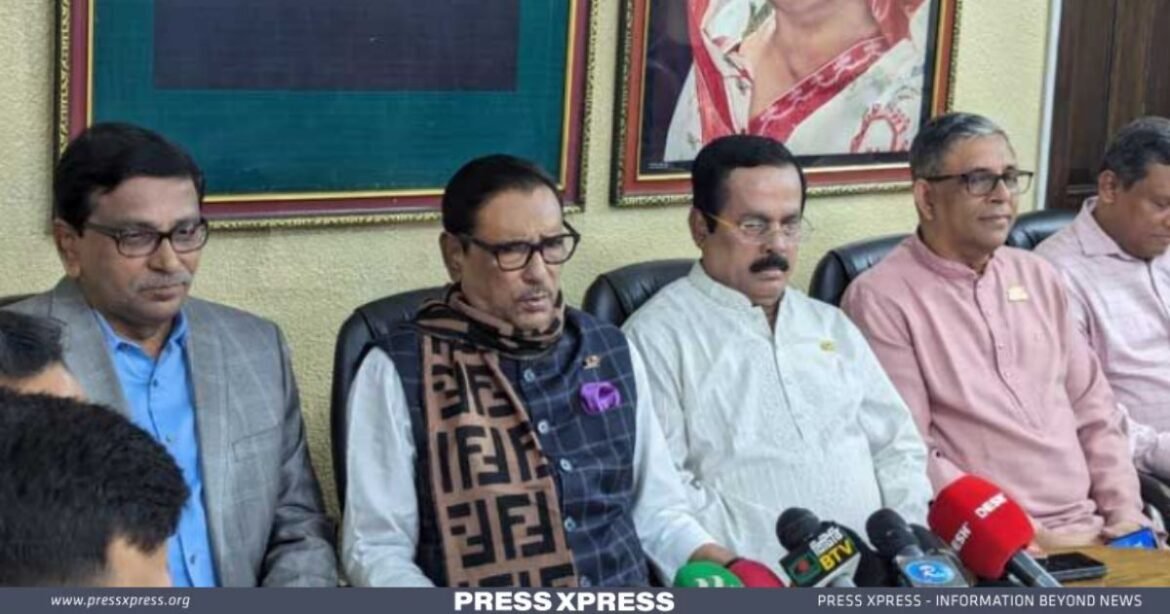- BNP-Jamaat of planning chaos on Human Rights Day
- BNP’s ties to Jamaat-e-Islami, suggesting a potential shift in BNP’s leadership dynamics towards Jamaat’s dominance
- Quader aims for Jatiya Party to emerge as a robust opposition, ongoing discussions for seat allocation
The political atmosphere in Bangladesh has been charged with allegations and counter-allegations as Awami League (AL) General Secretary Obaidul Quader accused the BNP-Jamaat alliance of attempting to sow chaos across the nation on Human Rights Day. Quader made these remarks during a press briefing at the Awami League president’s political office, highlighting what he described as the opposition’s failure to gain popular support, leading them to resort to disruptive tactics.
You Can Also Read: BNP-Jamaat’s Anarchy Threat to Nation’s Stability
“In light of their unsuccessful movement due to a lack of public participation, they have turned to sabotage,” Quader stated emphatically, underscoring his concerns about the strategies adopted by the opposition alliance. This bold accusation outlined a belief within the ruling party that the opposition’s motives were now geared towards disruptive actions rather than constructive engagement with the populace. Recent nation-wide strikes orchestrated by the BNP and its allies, once capable of bringing the nation to a standstill, have encountered a surprising lack of resonance. This deviation from the norm signals a transformative phase in the socio-political fabric of the country.
B-team’ of the Jamaat-e-Islami
Obaidul Quader branded the opposition BNP as the ‘B-team’ of the Jamaat-e-Islami. BNP is making political missteps and has grown significantly closer to Jamaat. BNP seems solely focused on aligning with Jamaat, yet the reality is that BNP seems to be detached from public sentiment due to this alliance. It’s conceivable that Jamaat could eventually steer the core of BNP, making it the ‘B-team’.
The ongoing disruptive hartal and blockade campaigns, steered by the BNP-Jamaat coalition, are losing their efficacy as people resist these protest methods due to the widespread damage and acts of arson-terrorism they entail.
The current unsettling efforts to create chaos by activists aligned with BNP-Jamaat are causing worry. If the situation worsens before the elections, Bangladesh might regress into a distressing state of poverty and uncertainty.
Quader further censured the BNP, attributing their political misguidance to their close association with Jamaat-e-Islami. He hinted at a potential shift in power dynamics, envisioning a scenario where Jamaat could emerge as the primary force behind BNP, relegating BNP to a secondary role under Jamaat’s influence.
Addressing the matter of the locked BNP office, Quader challenged the opposition, boldly stating, “They (BNP) have sealed their own office. If they are courageous enough, let them come forward.”
The political future of BNP remains uncertain as the party declined to participate in polls despite repeated calls and growing divisions within its ranks.
Shifting the conversation to the imminent general elections, Obaidul Quader acknowledged the presence of opposition parties, particularly highlighting the Trinamul BNP as the leading alliance, alongside various other competitors. He also expressed a desire for Jatiya Party to establish itself as a robust opposition entity, revealing ongoing discussions between AL and Jatiya Party for seat allocation and symbol distribution.
Moreover, Quader addressed the issue of the locked BNP office, implying a challenge to the opposition to confront the situation directly. “They (BNP) themselves have locked the BNP office. Let them come out if they dare,” he declared, signaling a confrontational stance.
No Rally on Human Rights Day
The General Secretary also mentioned the AL’s decision not to hold a rally on December 10, Human Rights Day, in compliance with the EC’s stance against public gatherings on the occasion. This gesture was framed as a show of respect for institutional regulations. Quader’s reflection on the historical struggles for democracy in Bangladesh, highlighting figures like Sheikh Mujibur Rahman and Sheikh Hasina, serves as a reminder of the nation’s journey towards democratic governance.
As these statements reverberate through the political spectrum, they ignite anticipation and apprehension regarding the country’s political future. The allegations and counter-allegations between the ruling party and the opposition deepen the rift, painting a picture of a politically charged environment as the nation braces itself for potential upheavals.
Commitment to Fair 12th National Election
As Bangladesh anticipates its 12th National Election, the air is thick with optimism as political leaders from various parties express their hopes for a free, fair, and inclusive electoral process. Emphasizing the commitment to ensuring free and fair elections, Quader assured that the incumbent government is collaborating with the Election Commission (EC) to achieve this goal. He underscored the government’s role in supporting the EC’s efforts, stating, “The government’s task is to cooperate with the EC in holding a beautiful and fair election. And we are doing so.”
Quader also touched upon the jurisdiction of the EC, suggesting an expanded role for the Commission in economic and administrative matters while affirming the government’s commitment to adhering to its routine duties.
Govt’s Pledge to Ensuring 12th National Election
The diversity of candidates and their vibrant competition in the electoral landscape create an encouraging scenario for Bangladesh’s 12th National Election. The government’s commitment to democratic principles shines through in the array of candidates and the steps taken to guarantee a safe voting atmosphere. With the nation preparing for what could be a historic turnout, there’s a tangible optimism that this election will not only showcase the resilience of democracy but also set the stage for a more comprehensive and representative governance.
In conclusion, individuals reject politics characterized by vandalism, arson, and violence resulting in harm to others. To let Bangladesh shine, opposition political parties should stop these destructive movements immediately.


